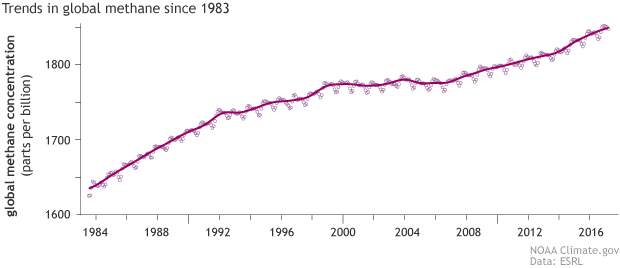Even if all the concerns around methane are real(and I suspect like everything else, they get greatly exaggerated) we are still better to transition to natural gas from coal. Methane is much shorter lived in the atmosphere, around 10 years, vs 100. Though even that lifetime is kind of an unknown, as shown at the link below. So by replacing coal with what the worst case says is equivalent emmisions, you have really cut the long term potential by 90%. If we find alternatives by say 2050 and close all the NG plants, that means a relatively instant drop of greenhouse emmisions, vs needing 100 years for the CO2 to dissipate.
The other reason I question the panic around it is that atmospheric concentrations fossil fuel isotopes do not correlate with the increase:
Quote:
Schwietzke’s research suggests that methane emissions from fossil fuels are higher than countries’ self-reported inventories suggest, and they may even be increasing. And yet, he explained via email, methane derived from fossil fuels is enriched with carbon-13—a rare, heavy isotope of carbon—and air samples show that the amount of carbon-13-flavored methane is dropping worldwide.
The drop seems to rule out fossil fuel emissions, wildfires, or biomass cook stoves as the reason for the post-2007 methane surge. All those sources of methane, to a greater or lesser extent, are enriched in carbon-13, not depleted.
It’s a counterintuitive finding: methane from fossil fuels is higher than we thought, but it seems to be making up a smaller share of total global emissions. In his email, Schwietzke wrote, “The decline in the 13-C isotope of methane in the atmosphere indicates that microbial sources must have an increasing share of total methane emissions globally.”
|
https://www.climate.gov/news-feature...ting-new-highs
You can also see a lack of correlation between atmospheric methane and our usage:

 https://www.eia.gov/todayinenergy/detail.php?id=32912
https://www.eia.gov/todayinenergy/detail.php?id=32912
If fracking and natural gas consumption were the sole cause of increased atmospheric methane, we would expect to not see a plateau in the 2000's, and a far more rapid increase of the rates seen before 2000. Plus the isotope issue. I think there is far more uncertainty around methane than is presented in the media and I think we need to figure that out before saying natural gas is just as bad as coal.